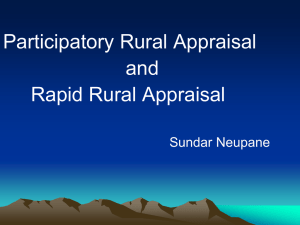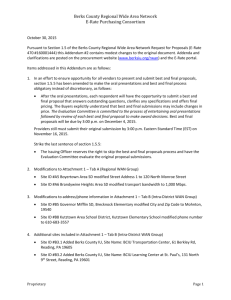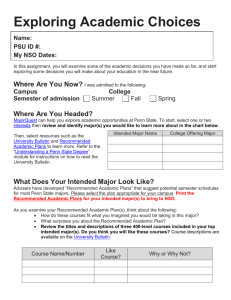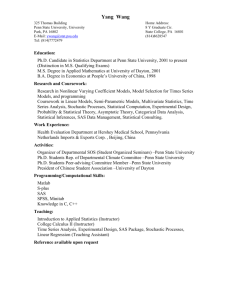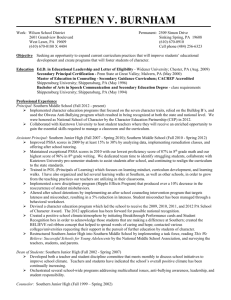Plan — Research — Assess!
advertisement
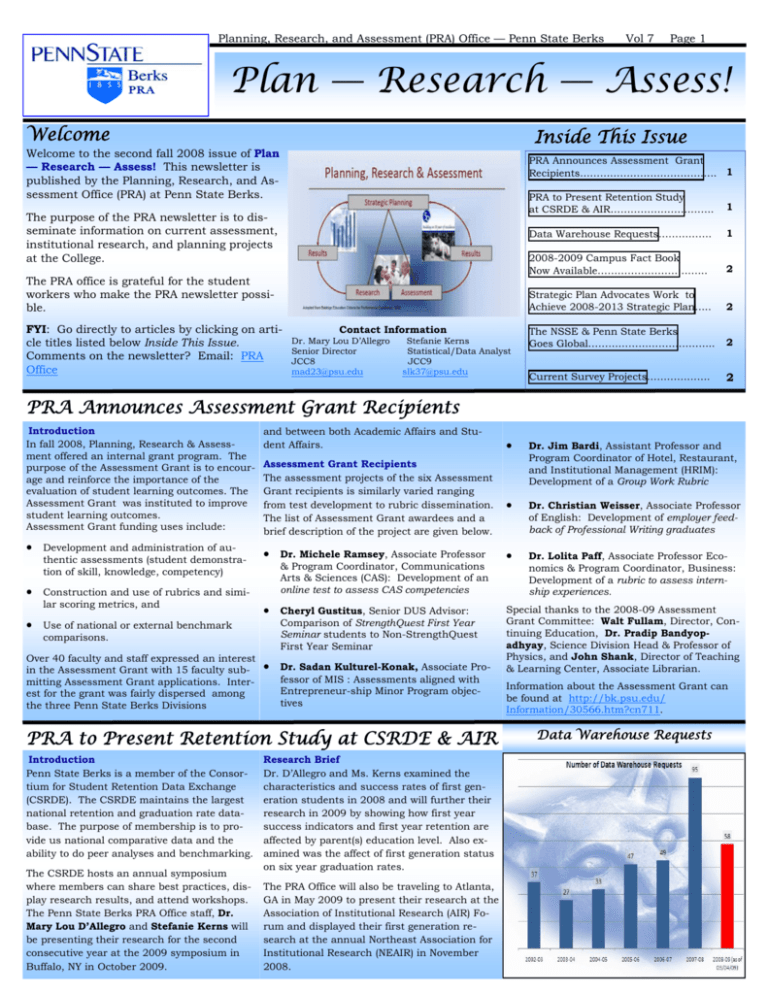
Planning, Research, and Assessment (PRA) Office — Penn State Berks Vol 7 Page 1 Plan — Research — Assess! Welcome Inside This Issue Welcome to the second fall 2008 issue of Plan — Research — Assess! This newsletter is published by the Planning, Research, and Assessment Office (PRA) at Penn State Berks. PRA Announces Assessment Grant Recipients………………………………….. 1 The purpose of the PRA newsletter is to disseminate information on current assessment, institutional research, and planning projects at the College. The PRA office is grateful for the student workers who make the PRA newsletter possible. FYI: Go directly to articles by clicking on article titles listed below Inside This Issue. Comments on the newsletter? Email: PRA Office Contact Information Dr. Mary Lou D’Allegro Senior Director JCC8 mad23@psu.edu Stefanie Kerns Statistical/Data Analyst JCC9 slk37@psu.edu PRA to Present Retention Study at CSRDE & AIR…………………………. 1 Data Warehouse Requests……………. 1 2008-2009 Campus Fact Book Now Available…………………………... 2 Strategic Plan Advocates Work to Achieve 2008-2013 Strategic Plan….. 2 The NSSE & Penn State Berks Goes Global……………………………….. 2 Current Survey Projects………………. 2 PRA Announces Assessment Grant Recipients Introduction In fall 2008, Planning, Research & Assessment offered an internal grant program. The purpose of the Assessment Grant is to encourage and reinforce the importance of the evaluation of student learning outcomes. The Assessment Grant was instituted to improve student learning outcomes. Assessment Grant funding uses include: • Development and administration of authentic assessments (student demonstration of skill, knowledge, competency) • Construction and use of rubrics and similar scoring metrics, and • Use of national or external benchmark comparisons. Over 40 faculty and staff expressed an interest in the Assessment Grant with 15 faculty submitting Assessment Grant applications. Interest for the grant was fairly dispersed among the three Penn State Berks Divisions and between both Academic Affairs and Student Affairs. Assessment Grant Recipients The assessment projects of the six Assessment Grant recipients is similarly varied ranging from test development to rubric dissemination. The list of Assessment Grant awardees and a brief description of the project are given below. The CSRDE hosts an annual symposium where members can share best practices, display research results, and attend workshops. The Penn State Berks PRA Office staff, Dr. Mary Lou D’Allegro and Stefanie Kerns will be presenting their research for the second consecutive year at the 2009 symposium in Buffalo, NY in October 2009. Dr. Jim Bardi, Assistant Professor and Program Coordinator of Hotel, Restaurant, and Institutional Management (HRIM): Development of a Group Work Rubric • Dr. Christian Weisser, Associate Professor of English: Development of employer feedback of Professional Writing graduates Dr. Lolita Paff, Associate Professor Economics & Program Coordinator, Business: Development of a rubric to assess internship experiences. • Dr. Michele Ramsey, Associate Professor & Program Coordinator, Communications Arts & Sciences (CAS): Development of an online test to assess CAS competencies • • Cheryl Gustitus, Senior DUS Advisor: Comparison of StrengthQuest First Year Seminar students to Non-StrengthQuest First Year Seminar • Dr. Sadan Kulturel-Konak, Associate Professor of MIS : Assessments aligned with Entrepreneur-ship Minor Program objectives Special thanks to the 2008-09 Assessment Grant Committee: Walt Fullam, Director, Continuing Education, Dr. Pradip Bandyopadhyay, Science Division Head & Professor of Physics, and John Shank, Director of Teaching & Learning Center, Associate Librarian. PRA to Present Retention Study at CSRDE & AIR Introduction Penn State Berks is a member of the Consortium for Student Retention Data Exchange (CSRDE). The CSRDE maintains the largest national retention and graduation rate database. The purpose of membership is to provide us national comparative data and the ability to do peer analyses and benchmarking. • Research Brief Dr. D’Allegro and Ms. Kerns examined the characteristics and success rates of first generation students in 2008 and will further their research in 2009 by showing how first year success indicators and first year retention are affected by parent(s) education level. Also examined was the affect of first generation status on six year graduation rates. The PRA Office will also be traveling to Atlanta, GA in May 2009 to present their research at the Association of Institutional Research (AIR) Forum and displayed their first generation research at the annual Northeast Association for Institutional Research (NEAIR) in November 2008. Information about the Assessment Grant can be found at http://bk.psu.edu/ Information/30566.htm?cn711. Data Warehouse Requests Planning, Research, and Assessment (PRA) Office — Penn State Berks Vol 7 Page 2 2008-2009 Campus Fact Book Now Available The second annual Penn State Berks Fact Book is now available. The Berks Fact Book provides some of the most commonly requested information about the campus in an easily accessible format. The Fact Book provides historical and comparative information that was compiled from several data sources including the Data Warehouse, EIS, and the Common Data Set from the University Budget Office. Development of the 2008-2009 Penn State Berks Fact Book The content of the fact book was assembled based on: • Previous data requests, • Reports submitted to external agencies, and • Data that was deemed useful in assessment, strategic planning, and the general research of the success of Penn State Berks students. An advantage of a campus fact book is threefold. First, much of the information about Penn State Berks is located in one central location. This lessens the time and effort needed to find information. In turn, by eliminating some of the barriers to data access increases the use of informa- Not surprisingly, a copy of the fact book or infortion in decision making and day-to-day operamation contained within tions. is requested as often by Penn State faculty Also, because of the consolidation of data in one and staff as it is by external constituents location, the faculty, staff, and students have such as accreditation bodies, Advisory Board, the opportunity to have a better understanding and Academic Program Advisory Councils. One of A Kind With the exception of University Park, no other Penn State campus has a published fact book. Certainly, no commonwealth campus has a formal fact book that is annually printed or available to faculty and staff. The 2008-09 Penn State Berks Fact Book is also available electronically and can be accessed by visiting the PRA Reports Web page: http://bk.psu.edu/Information/30464.htm? cn711. PRA Reports As an aside, the PRA Reports web page also has links to previous fact books, recent survey results summaries, economic impact studies, and University reports. Additional requests and comments can be submitted by completing the Fact Book evaluation at the end of the Fact Book or contacting the PRA Office. Strategic Plan Advocates Work to Achieve 2008-2013 Strategic Plan Strategic Plan Advocates Strategic plan advocates have been designated for each of the year one action steps for the 2008-2013 Strategic Plan, Building on 50 Years of Excellence. Strategic plan advocates are leaders in specific campus areas. As such, they are responsible for • Monitoring their respective action steps, • Providing status to the Strategic Planning Council (SPC), and • Identifying resources needed to bring the action steps to fruition. One of the most important functions of the Strategic Plan Advocates is the management of the Berks Strategic Plan scorecard. Strategic Plan Scorecard In brief the Berks Strategic Plan Scorecard provides a visual representation of the status of the first year action steps in a centralized location. Status levels are color coded green, yellow, or red depending on the extent the action step is being realized or met. Similar to the logic of a stop light, red indicates no progress while green indicates that the action step has been met. The scorecard is on the P: drive and available on request. Those interested in becoming an Strategic Plan Advocate should contact the PRA Office. Figure 1: Example of the Action Steps Listed in the Penn State Berks Strategic Plan Scorecard Updates on the status of the 2008-2013 Strategic Plan can be found at http://bk.psu.edu/ Information/30043.htm?cn711. A list of the 2008-09 Strategic Plan Advocates is available at http://bk.psu.edu/ Information/30843.htm?cn711. The NSSE & Penn State Berks Goes Global Introduction The National Survey of Student Engagement (NSSE) Committee is currently working on recommendations based on the 2008 NSSE results. The NSSE was administered to both first year and senior students attending over 700 institutions across the United States. Ten other Penn State (PSU) campuses including University Park participated in 2008. One of the many advantages of the NSSE is the availability of comparative data, specifically to peer and benchmark institutions. This includes the results of the other nine participating PSU campuses. Study Abroad Opportunities Based on these peer and benchmark institution comparisons, the NSSE Committee recommended an examination of the current campus study-abroad program. According to the NSSE results, Berks students, particularly seniors, felt they did not have the same study-abroad opportunities as the other PSU campuses or peer institutions. recognition that Penn State must “become a truly global university” as stated by Dr. Michael Adewumi, Vice-Provost for Global Programs and Professor of Petroleum and Natural Gas Engineering. Campus & International Partners The University Office of Global Programs is developing new infrastructure including a portal showcasing current international initiatives. It is anticipated that Berks will tap into these resources to assist in the campus’ efforts to exComplicit with the NSSE Committee’s studypand it’s own global programming and studyabroad recommendation is the recent abroad offerings. Current Survey Projects ution of results. At present the following PRA Contact the PRA Office if considering a quessurvey projects include: tionnaire, survey, or focus group project. PRA Mid semester Audio-Comments as a Teaching can provide advice on instrument development, • Tool (Teaching & Learning Innovation Grant), research design, and survey administration. PRA also constructs online surveys, analyzes • Summer & Fall 2008 Recent Graduate Survey, survey results and provides guidance in the • Post Student Survey on Peer Substance Abuse, development of recommendations and distrib- • StrengthQuest First Year Seminar Survey, • Career Services “Client” Survey, • Non-Returning Student Survey, and • Academic Advising Exit Survey.

